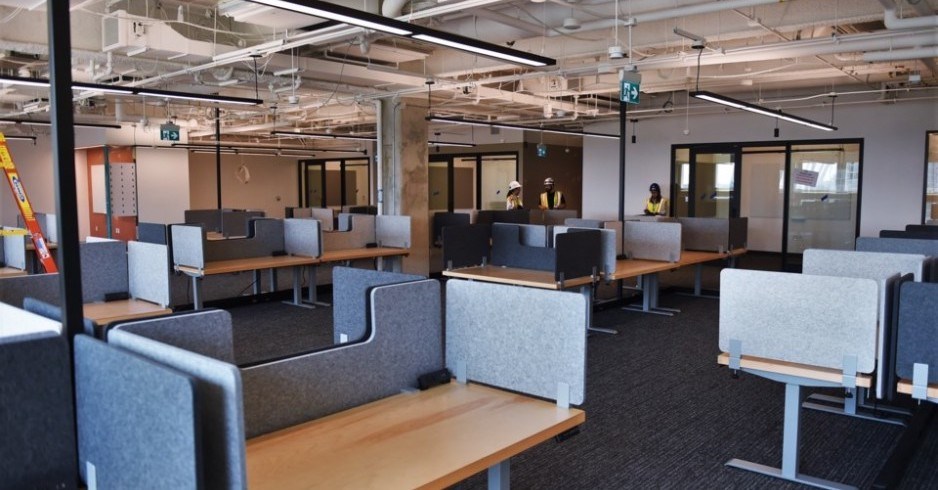Economic uncertainty and a push to get more employees to return to physical office spaces are influencing the recruitment efforts of B.C. technology companies.
The result is a changing landscape in office real estate that sees mostly larger companies investing in new space.
“Some companies are still holding on hiring. But we are seeing a lot of companies picking up hiring again, especially in the major tech hubs within Canada like Vancouver and Toronto. We’re definitely seeing those larger and mid-sized companies starting to pick up again and say it’s time to kick things off with hiring,” says Char Stark, senior talent acquisition specialist with recruitment firm Beacon HR.
Higher interest rates and inflation have resulted in weaker venture capital investment. This in turn means less hiring capacity at tech companies, says Ilya Brotzky, CEO and founder of the global technology hiring platform VanHack Technologies Inc.
“What investors are looking for right now is not necessarily growth, but profitability. So, a lot more companies are scaling back or sitting tight in terms of their hiring for trying to get more profitability,” he says.
Brotzky also says he believes that hiring efforts will increase this fall, especially compared to the “quiet summer” that he has seen.
A reluctant push for in-person work
Large technology companies such as Amazon.com Inc. and Meta Platforms Inc. have made a considerable push to bring workers back into the office.
“That’s having a trickle-down effect and people are trying to get employees back into the office and it’s happening very reluctantly.… It’s a sort of push and pull,” says Omar Visram, co-founder and CEO of Enkel Backoffice Solutions Inc., a tech-enabled bookkeeping service based in Vancouver.
Amazon asked that all of its employees return to its offices three or more days per week in February of this year. The global tech giant will also be moving employees into its new Vancouver office, which spans an entire city block. It is located in the former Canada Post building on West Georgia Street.
“The narrative evolves as we speak. As it stands, there is a strong desire from the executive level at most tech firms … to bring their staff back to the office,” said Andre Alie Day, an associate with commercial real estate firm CBRE’s high technology facilities group, in an email.
“Each company’s approach is slightly different, and all will encompass a hybrid element to it at this stage; but the value of the in-person collaboration and productivity of work in the office versus working at home has led to businesses starting to pull back on their remote work flexibility.”
For small and medium-sized companies that don’t have Amazon’s deep pockets, spending money on office space is not a priority, according to Brotzky.
“They can use that money for other things, and the fact that they don’t have to work in offices is a benefit that they’re using against larger companies who are perfect to go to the office,” he says.
At Victoria-based Certn, a technology startup that provides background checks, mandating in-person work would “absolutely” harm recruitment efforts, says Carla Arthur, Certn’s director of talent acquisition.
Visram says many of his employees prefer remote work. He describes how the company is offering pay differentials to incentivize employees to return to the office full-time.
“Most of our people don’t work in the office. We do have a physical office here in Vancouver, where over the past few years we’ve had some people working hybrid. We’re moving away from hybrid to either your full time in the office or you’re working remote,” he says.
“If you mandate in office, you’re limiting your recruitment jurisdiction. There are people that want to be in the office and people that don’t want to be in the office. So, I’d say it probably ends up being a limiting factor if you mandate one way or the other.”
Eye-catching offices as incentives
As companies navigate post-pandemic workplace adjustments, some technology companies are using new, first-class office spaces to incentivize a return to in-person work, according to Day.
“There is a real trend in flight to quality, with A/AAA class buildings that feature the modern building standards that companies are looking for achieving higher occupancy rates among employees and lower vacancy,” Day says.
Stark also notes that one of the biggest incentives for employees to return is personal connection among team members.
According to Amazon, there has been positive feedback regarding employee connectedness when staff are in the office. The Post includes dedicated “Team Suites” where employees can brainstorm and collaborate. It also has dog parks, sports courts and outdoor spaces as added amenities.



